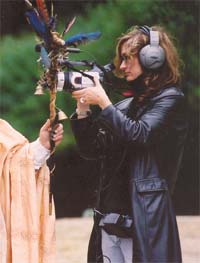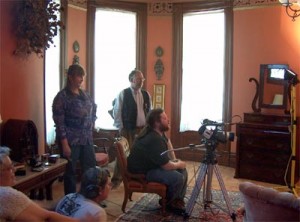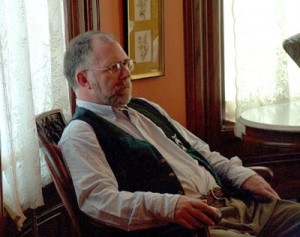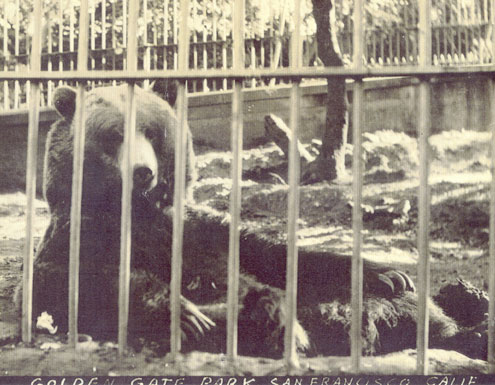
Dr. Karr has extensive training in utilizing video film as a therapeutic method in terms of cognitive behavioral therapy. In filming sessions with clients and then replaying the film with them, it has been his experience that it helps clients have a more accurate and intimate understanding of their own behaviors, emotional expressions, and personae. Most people’s perceptions of themselves are fairly inaccurate.
Through film therapy, clients are able to see their behavior patterns, mannerisms, expressions, and communications, and their effects upon other people much clearer when they see a film of themselves. Once people become more aware of their unconscious body’s communication, a process can develop which can result in improved, more fully present expression of one’s self.
Film helps clients to break through denial concerning their own behavior and thought patterns. A client who is very used to being negative, for example, constantly making negative statements about themselves or others, may not be aware of these patterns. The client often becomes much more aware of the patterns of negativity and how destructive it is by standing outside of themselves and watching themselves be negative. This video film process is particularly helpful in couples therapy because it facilitates the members of a couple in facing the reality of how they relate and communicate with each other. Film therapy is particularly helpful to see and understand subtle patterns of communication, body affect, posture, tone of voice and how these subtle yet important communications effect others.
A goal of film therapy is to help clients become more conscious of their various communication patterns including, non-verbal, and body patterns. Many people are aware of the words they say but are not aware of their meta-communications including body posture, affect, eye movement, gestures, facial expressions, eye dilation, clothing, persona, etc. Film therapy is aimed at teaching people to be more consciously aware and in charge of these subtler meta-communications that they are constantly emitting and expressing. It is Dr. Karr’s experience that many people’s conflicts, relationship problems and work issues are often a result of communications involving such inner conflict.
Many people are not aware that their verbal communications are in conflict, maybe even opposite of, the messages that their affect, body posture, eye, and persona may be conveying. Practice with film therapy enables a client to become more fully aware of their communications and become much more adept at expressing their various communications in a manner congruent with their intentions. This greatly improves one’s ability at communication with other people.

This method is not only aimed at learning control over one’s verbal and physical expressions, although this is certainly one result that can be expected from this kind of therapy. Rather the real learning and depth to this approach involves the idea that much of human consciousness is unconscious and in a Jungian sense therapy is aimed at bringing as much awareness out of the unconscious into the consciousness. The film therapy process is very helpful in allowing the client to look at many of the aspects of their emotional and body consciousness that they may not be aware of.
It is the belief of many body psychologies that a good deal of one’s psyche that is unconscious is stored in the muscles, bones and nerves of the physical self. The purpose of film therapy is to tune-in to observe and listen to the many non-verbal expressions of self that occur in unconscious regions of the body. This method enables the client to perceive, observe and come to a better understanding of their emotional body and self.
Many clients are depressed, anxious or angry and they are not conscious of these emotional states. They may be conscious of these emotional states but they believe that the outer world is not aware of their emotions because they have not verbally expressed them. This is often a fallacy in that the clients emotional affect, their body posture, their eye contact may be expressing clearly that they are depressed, anxious, or angry. Many clients are in denial at how much their non-verbal communication may be negatively impacting their relationships, their work, and the world around them. Often for example with passive- aggressive personalities, a person’s words may be very nice and sweet, while their body language or affect is aggressive and hostile. Film therapy is an incredible tool for exploring the self and coming to a more accurate perception of self.

Film therapy is also useful in terms of group therapy. It is helpful in group therapy through enabling a group to watch and come to an understanding of group process and interaction. Film therapy is also very useful to develop better social skills and personae for dating and professional enhancement. It has been Dr. Karr’s experience as a psychologist over the last twenty-five years that many clients are engaged in a good deal of self sabotage in their lives. This self-sabotage is very destructive in terms of personal relationships, professional relationships, and life success. Most clients enter therapy, they are not aware that their unhappiness and sense of failure in their life is being created and maintained by self-sabotaging thought patterns and behavioral patterns. Many of such self-sabotaging thought patterns and behavior patterns are mechanical in nature and are automatic and unconscious.
Many self-sabotaging communications are expressed on meta-communication levels. Meta-communications are communications we make that are greater than the words we speak. They include our persona, our affect, our body language, our posture, and all we convey through our bodies. Dr. Karr has found that some clients who have been in denial about their self-sabotage finally are able to perceive and admit to these patterns after observing them on film. It is useful for clients to be shaken out of denial that unresolved psychological issues are imperceptible to the outer world.
Film therapy helps clients to see the truth that their body and emotions are often telling a greater amount about them than their words do. Clients, as they become more conscious and emotionally healthy, become more congruent in terms of their verbal communications, meta-communications expressions and their inner life. It is the expressed goal of film therapy to facilitate this greater consciousness and congruence. It is also the philosophy of this approach that greater consciousness, communications, communion and success in the outer world can be achieved.
Film Therapy Process
Commitment
A client or couple will need to make a six-session commitment of two-hours per session with Dr. Karr. The first hour will involve filming a psychotherapy session. The second hour immediately following will involve the showing and review of the video. Dr. Karr will facilitate the client’s understanding and observing themselves in the video. Dr. Karr’s MFT intern, Renee Hudgins-Lopez, MA, will do the filming and participate in the following therapeutic observing of the film. The second hour observation of the film is meant to be educational and can be a deep therapeutic experience for the client or the couple.
Purpose and Intention
Dr. Karr will work with the client or couple to identify intentions and goals for the film therapy. These goals will include becoming aware of negative and destructive thought communication or behavioral patterns and then focus upon changing them. This methodology follows a cognitive behavioral approach to therapy. Other clients may wish to follow a more humanistic or Jungian approach and use this film methodology to become more aware of themselves and their patterns, to be more conscious and present in their bodies and bring more of their subconscious mind and emotions into their consciousness.
Confidentiality
Dr. Karr does not keep the videos from clients’ sessions. Rather the video will be available for clients to keep if they so choose and to use it for further learning, to monitor their change, or to erase it. Dr. Karr will not keep any copy of the videos. The videos produced from this kind of therapy are treated with the same confidentiality as all client information.
Fees
The cost for each two-hour film therapy will be $220. Dr. Karr has a sliding fee scale for regular therapy between $60 and $100 per hour. However because the film therapy involves an additional therapist and extra work there is no sliding fee scale for film therapy.
The Monarch Bear Institute – a Series of film projects
Dr. Karr, for the last two years and with the assistance of other film people, has been creating a series of film documentaries concerning the National Aids Memorial Grove, ecology, and the place of art as a healing process. He is now completing the creation of a non-profit film institute, called the Monarch Bear Institute, in order to support the development of film and art as healing processes. Dr. Karr in his role as film director, producer and actor has learned a good deal about himself through observing himself on film during the extensive above-mentioned filming.


Recent Comments